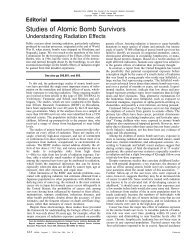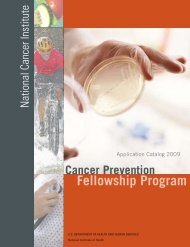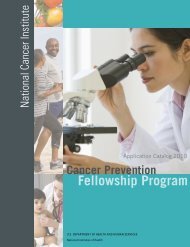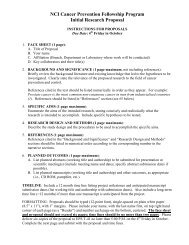Fellowship Program - National Cancer Institute
Fellowship Program - National Cancer Institute
Fellowship Program - National Cancer Institute
You also want an ePaper? Increase the reach of your titles
YUMPU automatically turns print PDFs into web optimized ePapers that Google loves.
Preceptorships<br />
Julia Rowland, Ph.D,<br />
Preceptor, Office of<br />
<strong>Cancer</strong> Survivorship,<br />
Division of <strong>Cancer</strong><br />
Control and Population<br />
Sciences, NCI<br />
The mission of<br />
the Office of <strong>Cancer</strong><br />
Survivorship is to<br />
enhance the quality of<br />
life and to improve the<br />
length of survival of all<br />
persons diagnosed with<br />
cancer, and to minimize<br />
or stabilize adverse<br />
effects experienced<br />
during cancer survivorship.<br />
The office conducts<br />
and supports research<br />
that both examines<br />
and addresses the<br />
long- and short-term physical, psychological,<br />
social, and economic effects of cancer, and<br />
its treatment among pediatric and adult<br />
survivors of cancer and their families.<br />
Director: Julia H. Rowland, Ph.D.<br />
Applied Research <strong>Program</strong><br />
The Applied Research <strong>Program</strong> plans,<br />
conducts, and supports research related to<br />
evaluating patterns and trends in cancer-related<br />
risk factors, health<br />
behaviors, economics,<br />
outcomes, health services<br />
and patient-reported<br />
outcomes; moreover<br />
the program determines<br />
the influence of those<br />
factors at the individual,<br />
societal, and systems<br />
level on patterns and<br />
Rachel Ballard-Barbash,<br />
M.D., M.P. H.,<br />
Preceptor, Applied<br />
Research <strong>Program</strong>,<br />
Division of <strong>Cancer</strong><br />
Control and Population<br />
Sciences, NCI<br />
trends in measures of<br />
cancer burden, including<br />
incidence, morbidity,<br />
mortality, and survival.<br />
Associate Director:<br />
Rachel Ballard-Barbash,<br />
M.D., M.P. H.<br />
The Health Services and Economics<br />
Branch supports, conducts, and coordinates<br />
research on the dissemination of effective<br />
cancer-related health services into community<br />
practice. The branch studies demographic,<br />
social, economic, and health system factors as<br />
they relate to providing preventive, screening,<br />
diagnostic, and treatment services for cancer.<br />
The ultimate purpose of this research is to<br />
improve cancer outcomes, reduce cancer-related<br />
health disparities, and reduce the burden of<br />
cancer to patients, their families, and society.<br />
Chief: Martin Brown, Ph.D.<br />
The Outcomes Research Branch conducts,<br />
coordinates and sponsors research to measure,<br />
evaluate, and improve patient-centered outcomes<br />
of cancer care delivery across the cancer care<br />
continuum. The branch is particularly interested<br />
in morbidity and mortality outcomes, patient<br />
symptoms and health-related quality of life<br />
(HRQOL), patient experience of and satisfaction<br />
with health care, and social and economic<br />
consequences of cancer care.<br />
Chief: Steven Clauser, Ph.D.<br />
The Risk Factor Monitoring and Methods<br />
Branch is responsible for monitoring cancer-related<br />
risk factors among the general U.S. population and<br />
among selected population subgroups defined by<br />
gender, age, race, and ethnicity; developing and<br />
improving the methods of assessing such risk<br />
factors; and providing data to assist in formulating<br />
public policies addressing these factors.<br />
Chief: Susan Krebs-Smith, Ph.D.<br />
<strong>Cancer</strong> Prevention <strong>Fellowship</strong> <strong>Program</strong> 27








